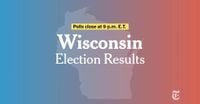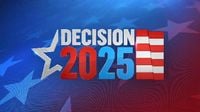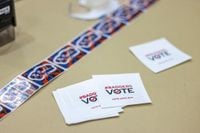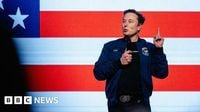Wisconsin voters have returned to the polls for a crucial Supreme Court election that has become a national focal point, largely due to the involvement of billionaire Elon Musk. The election, held on April 1, 2025, is notable not only for its high stakes but also for the staggering amount of money spent—over $90 million, making it the most expensive judicial contest in U.S. history.
The candidates in this nonpartisan race are conservative Brad Schimel, backed by President Donald Trump and Musk, and liberal Susan Crawford, who has the support of former President Barack Obama and prominent Democratic donors like George Soros. Currently, the Wisconsin Supreme Court is controlled by a 4-3 majority of liberal justices, but this election could flip that balance.
According to the Wisconsin Elections Commission, early voting numbers were significant, with about 644,000 residents casting their ballots prior to Election Day. This heightened interest reflects the emotional stakes involved, particularly given Musk's controversial role in the campaign. His contributions alone total $20 million, and he has been actively campaigning for Schimel.
On March 30, Musk hosted a rally where he handed out two $1 million checks to voters who signed a petition against what he termed "activist judges" that might obstruct Trump's agenda. This rally was indicative of Musk's strategy to galvanize support for Schimel while simultaneously energizing his base of supporters.
Local canvasser Ronneisha Mallet emphasized the broader implications of this election, stating, "This really matters. People aren't looking at the bigger picture. People just think this is just a local election. But it goes all the way to the White House." Her sentiments capture the perception that the outcome of this election could reflect voter sentiment towards Trump and his policies.
Responses from voters have varied widely. One independent voter, who identified herself as Peggy, expressed her disdain for Musk, saying, "I hate Musk! I hate his guts!" She criticized his financial influence, suggesting he was attempting to "buy the election here" after previously spending a quarter of a billion dollars to support Trump's presidential campaign.
Meanwhile, supporters of Schimel have defended Musk's involvement, arguing that wealthy individuals have always played a role in politics. Conor Gunar, a Schimel supporter, remarked, "Democrats have people like George Soros and JB Pritzker; why can't we have billionaires?" This sentiment reflects a growing acceptance among some voters of the financial backing that comes from affluent individuals in political races.
As the election unfolded, the Democratic Party strategists sought to capitalize on Musk's unpopularity. A Marquette Law School poll indicated that 53% of registered voters viewed Musk unfavorably. This gave Democrats a potential avenue to mobilize opposition against Schimel by framing the election as a referendum on Musk's influence in politics.
Ben Wickler, chairman of the Wisconsin Democratic Party, articulated the stakes involved, stating, "If Crawford could beat Schimel, there'll be a very clear kind of game plan for how to fight back against the world's richest man trying to destroy American democracy." The outcome of this election is being closely monitored as a possible indicator of future political dynamics in Wisconsin and beyond.
The election also features a ballot measure that would amend the state constitution to include a requirement for voters to show photo identification. While Wisconsin already mandates voter ID, the proposed amendment would make it more difficult to repeal this requirement through legislative or judicial avenues.
As votes are counted, the implications of this election extend far beyond Wisconsin. The results could signal a shift in the political landscape, particularly as the nation gears up for the 2026 and 2028 election cycles. Observers are keenly aware that Wisconsin has been a battleground state, with Trump winning it by less than a percentage point in the 2024 presidential election.
Political analysts have noted that the Wisconsin Supreme Court election serves as a litmus test for both parties. Allison Prasch, a professor at the University of Wisconsin-Madison, pointed out that the dynamics in Wisconsin could provide valuable insights into voter behavior and preferences in the upcoming elections.
As the final results are anticipated, Wisconsin residents are left to ponder not just the future of their Supreme Court but also the broader implications of money in politics and the influence of high-profile figures like Musk. The outcome may well define how political contests are fought in the years to come, as both sides strategize to either maintain or gain power in a rapidly changing political environment.
In the end, this election is not just about a seat on the Wisconsin Supreme Court; it has morphed into a referendum on the role of money in politics, the influence of billionaires like Musk, and the ongoing battle for control of the judicial system in America.







